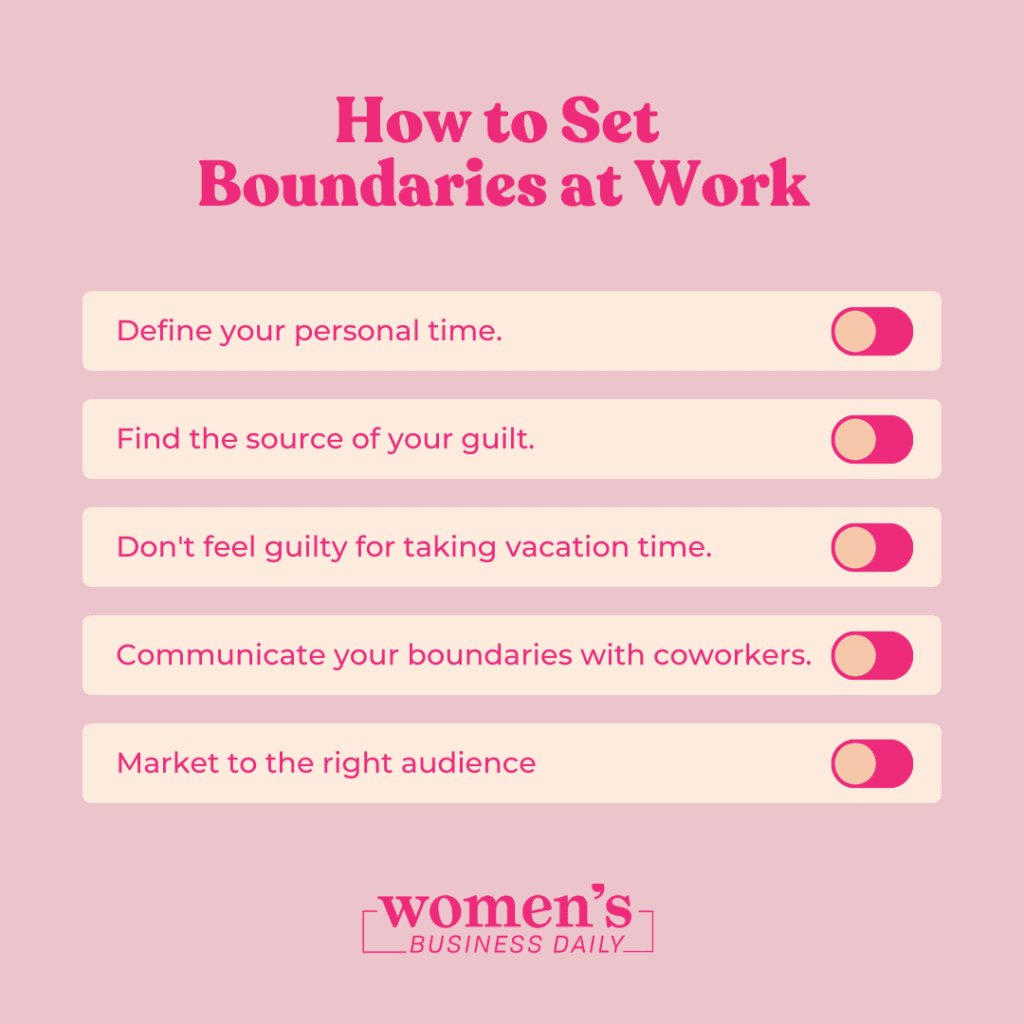As hard as we try, technology makes it extremely difficult to maintain a barrier between your professional and personal life. If you get an email from your boss while you’re watching a movie with your partner, it’s extremely enticing just to send a quick response.
That’s what a good employee would do, right?
But that’s not what a good partner would do. And good employees are those who can fully commit in the office because they’ve set boundaries between the professional and personal. For the sake of your mental health, it’s vital that you learn to separate those two parts of your life.
If you’re finding it difficult to separate your work and family life, you’re not alone. Here are some tips to consider so you can get closer to achieving a healthy work-life balance.
Healthy Work-Life Balance
The ideal work-life balance is when you’re able to fully engage in your career and maintain a great relationship with your family. Of course, these two aspects of life aren’t always so simple to balance. But it is possible if you know what steps to take.
Here are a few tips to help you maintain a healthy work-life balance:
1. Know how much time you need for work and personal life
The first step in achieving a healthy work-life balance is knowing how much time to spend with your family and how much time to spend at the office. If you’re not sure, it’s important to ask yourself what type of work-life balance you want.
2. Find out when it’s time to stop working
When most people start thinking about this, they don’t know when enough is enough. Most would rather work more hours “just in case” there is something that needs to be finished. But it’s important to know when you should say “no.”
3. Go home on time
If you can, try to end the workday when you leave the office. Working long hours is sometimes something we have to do, but it shouldn’t be a regular thing.
4. Set aside time specifically for email and meetings
Be purposeful with your time. It might be difficult, especially if your job entails attending meetings almost every day or checking your emails at all hours of the day. But if you’re able to segment checking emails to specific times of day (morning, after lunch, and before you leave) and keep meetings limited to certain days of the week – you’ll find that you have much more time to get the important tasks completed.
5. Prioritize the tasks that need to be done first
With so much information at your fingertips, it’s easy to think that everything needs to be done right now. You have to remember that you don’t have all the time in the world. Some tasks are more important than others and need to be addressed first.
6. Use technology to help yourself
Technology has made it increasingly difficult to maintain a proper work-life balance. If you find yourself glued to your computer screen, try the “do not disturb” feature on your smartphone. This will let people know that you can’t answer their calls. If this doesn’t work for you, try setting specific hours where friends and family know they won’t be able to reach you.
The Pitfalls of Technology
While one of the blessings of technology is that we can work from anywhere. One of the main problems is that we can work from anywhere.
Quite the conundrum, isn’t it?
Working from home can be a very empowering tool for some people. It can give working parents flexible hours to care for kids at home. It gives people with disabilities the ability to work within a safe space. And it makes it possible for someone to work for an international company that they would never have the chance to work for under normal circumstances.
However, this flexible work comes at a price. Unless you judiciously choose when you remotely work, you might find that you end up working all the time.
When your office is in your kitchen, the lines between what is a living space and what is a workspace are extremely blurry. It’s much more difficult to shut off your work brain. Because you can’t physically drive away from an office to leave it all behind you.
Be strict in setting your work hours. Even if you work untraditional hours, set timers and obey them. When that alarm goes off, shut off the computer and don’t let yourself reply to any work emails. Walk away from whatever makeshift office you have and enter another room.
Any time you decide to answer an email or catch up on work, turn on a stopwatch on your phone. If you’re strict about doing so, you’ll soon see just how many extra work hours you’re accidentally sneaking into your day.

A Workaholic Boss and Toxic Work Culture
Unfortunately, some bosses do not maintain a healthy work-life balance, and they set the culture for the whole office. When they can’t divide their work and life schedules, they expect their employees to do the same.
If you’re a new employee or you’re trying to stay in your boss’s good graces, it’s extremely tempting to answer those after-hours emails and stay accessible to answer their calls at all times.
However, if you’re going to avoid burnout and be the best employee you can be, you need to set those boundaries for yourself.
For example, if you are in a situation where you need to meet a deadline, you might need to work longer hours. However, instead of bringing your work home with you, stay later in the office.
While it might seem appealing to bring your laptop home and get some work done on the couch, your quality of work and your efficiency will be much higher in the office. You’ll be able to get it done more quickly, and once you get home, you’re done. You don’t have to devote any more of your evening to work-related tasks.
Your boss will respect your dedication to the project, but you don’t have to break down the barriers between your home and office.
When you bring work home, you’re only blurring the lines further between the time you’re at work and the time you’re relaxing and focusing on your family. When this happens, you will neither be fully productive nor fully relaxed, which doesn’t let you work at your full capacity or rejuvenate yourself for the next day in the office.
Don’t let your boss’s toxic relationship with work impact your own.
Setting Boundaries
No matter if you work in a physical office or you work from wherever you can get a Wifi connection, you need to learn the discipline of setting healthy boundaries.
In order to set these boundaries, you need to:
Define your personal time.
Setting aside time to spend with your significant other, to pursue your passion projects, to hang with your friends, to get work done around the house, and to do nothing at all is important. This free time makes you a better, more focused employee. And also, it is important to your development as an individual. You were not made just to work.
Find the source of the guilt.
Spending time away from work should not bring you a feeling of shame. Is this sense of uneasiness coming from within?
Do you feel guilty if you don’t respond immediately because of your tenacious work ethic? Or is the pressure coming from your place of work? Once you determine the source of this discomfort, you can address it.
Not feel guilty for taking vacation time.
You are given vacation days and PTO for a reason. If your office makes you feel guilty for using it, this is your opportunity to stand up to, and hopefully, change, toxic work culture.
Get all of your projects in good shape and gather all resources any coworkers will need to work without you. If you send out proper communication with all the information people will need while you’re gone, they will have no reason to contact you while you’re enjoying some much-deserved relaxation.
Make it clear in that email that you will not be available to answer questions while you are gone. So if they need any clarification, seek it before you leave.

Managing Stress
One of the problems that arise when you don’t set boundaries between work and home is stress. If you’re constantly thinking about an assignment due at work, it can be difficult to relax and enjoy yourself with your loved ones.
The first step to achieving a healthier balance is learning how to manage your stress. Make it a regular habit to do some breathing exercises or listen to relaxing music when you get home from work. When you’re more relaxed, you can enjoy your time with your family without worrying about what needs to be done at the office.
Working Smarter, Not Harder
One of the biggest factors in trying to manage work-life balance is determining how much time you can afford to spend at work. Some people are fortunate enough to set hours where they’re only expected to clock in a certain number of hours each day.
But others aren’t so lucky, and many employees feel obligated to put in extra hours even though it isn’t expected.
Overworking yourself isn’t healthy for you or your family, so it’s important to learn how to work smarter – not necessarily harder. This means planning out your day and prioritizing the most important tasks on your list.
The Benefits of a Healthy Work-Life Balance
We weren’t built to be at the beck and call of our bosses at all times. Even if you work in an environment like a hospital, you have certain hours where you’re paid to be on-call; you aren’t on-call at all times. If your boss treats you like you are, this toxic culture needs to be addressed.
Although it may not sound intuitive, a good work-life balance makes you a better employee. While in the short-term, it may look good to be the person who is always available to take on more work, eventually, that person is heading for a breakdown.
Without consistent, scheduled times of devoted rest and quality time with the people you love, you’ll make yourself sick or have an emotional breakdown. Investing in your personal life and family time makes you a happier, more well-rounded person, and this will make you a healthier, happier employee.
But the benefits of a work-life balance shouldn’t just be for your office; it should be for you, too. You weren’t born to work away your whole life. Being a productive, helpful employee is important, but so is living a happy, fulfilled, purposeful life. You deserve to have both.
Published in Business, Featured Articles, LifeAuthor, Artist, Photographer.
Sarah Margaret is an artist who expresses her love for feminism, equality, and justice through a variety of mediums: photography, filmmaking, poetry, illustration, song, acting, and of course, writing.
She owns Still Poetry Photography, a company that showcases her passion for capturing poetic moments in time. Instead of poetry in motion, she captures visual poetry in fractions of a second, making cherished keepsakes of unforgettable moments.
She is the artist behind the Still Poetry Etsy shop, which houses her illustrations and bespoke, handmade items. She is the author of intricacies are just cracks in the wall, a narrative poetry anthology that follows a young woman discovering herself as she emerges from an abusive relationship.





